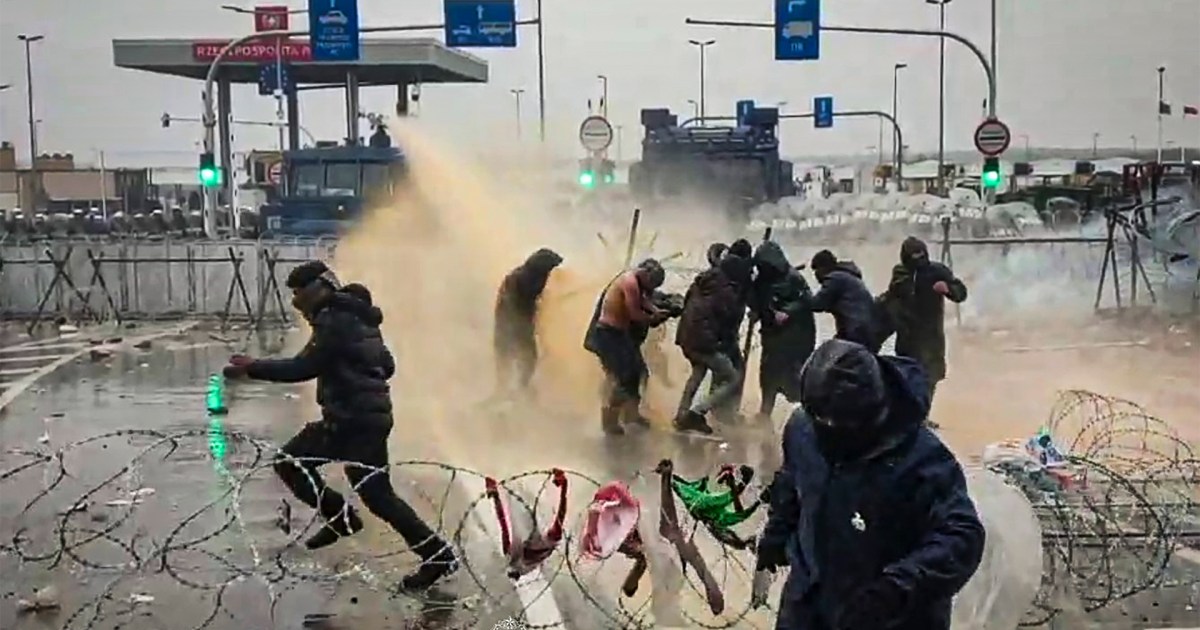Al-Jazeera correspondent said that the Polish police used tear gas and water cannons to prevent refugees from crossing the border fence with Belarus.
Amid international concern and Western sanctions, Minsk threatened to cut off gas.
The correspondent pointed out that the Belarusian security forces did not intervene to prevent asylum seekers from advancing towards the fence.
A government spokesman said in a statement that the clashes resulted in the injury of a number of police officers, border guards and a Polish soldier.
Meanwhile, Poland sent security and military reinforcements to its borders, and confirmed that it would continue to protect the borders and prevent asylum seekers from entering its territory.
About 4,000 asylum seekers, according to estimates from the Polish border guards, are crowding along the border with Belarus in miserable conditions, with temperatures dropping below zero.
Western powers accuse Belarus of fabricating the crisis with the support of Russia by bringing migrants to the borders to provoke disputes within the European Union, which Minsk and Moscow deny.
International parking
In response to the statements of Belarusian President Alexander Lukashenko to cut gas supplies to Europe, the German Federal Network Agency announced the temporary suspension of the procedures for ratifying the operating license of the Nord Stream 2 marine pipeline to transport gas from Russia to Germany for legal considerations.
The German authority said that the company operating the Russian gas pipeline must first be regulated in accordance with German law before certifying the pipeline, which is in the final stages before being put into service.
In this regard, French Prime Minister Jean Castix said on Tuesday that "the Lukashenko regime is inhumanely and disgracefully exploiting the flow of migrants, in an attempt to destabilize and dismantle the European Union. It is intolerable and unacceptable."
On Monday, the European Union and Washington announced the expansion of sanctions against Belarus in the coming days.
The union accuses Minsk of bringing in migrants in response to sanctions it has imposed on it for its violent crackdown on dissent since protests over the controversial 2020 presidential election.
In turn, NATO Secretary General Jens Stoltenberg said that Belarusian President Alexander Lukashenko is putting the lives of asylum seekers in danger.
As for the Belarusian president, he said at a government meeting, "All this is taking place under the protection of the European Union from the invasion of refugees who were bombed and looted by the Western coalition led by the United States," apparently referring to the Iraq war.
international concern
In this context, the United Nations expressed, on Tuesday, its concern about the conditions and treatment of refugees and migrants stranded at the border between Belarus and Poland.
Farhan Haq, Deputy Spokesman for the Secretary-General of the United Nations, told reporters at the UN headquarters in New York that these refugees and migrants must be treated with dignity and their concerns heard. These people act as tools and pawns in the conflicts that arise between nations.
Earlier, the French presidency stated that Russian President Vladimir Putin had agreed with his French counterpart Emmanuel Macron to reduce the escalation of the asylum seekers crisis, and the need for direct communication between the European Union and Minsk to resolve it.
On the other hand, Russian Foreign Minister Sergey Lavrov said on Tuesday that a solution to the refugee crisis at the border is possible through a direct dialogue between Belarus and the European Union, considering that the actions of the Polish military on the border with Belarus are a "violation of international human rights."
In turn, German Chancellor Angela Merkel had a phone call with Lukashenko that lasted about 50 minutes, and Belarusian state television reported that the focus was on calming the situation and humanitarian support for migrants.

